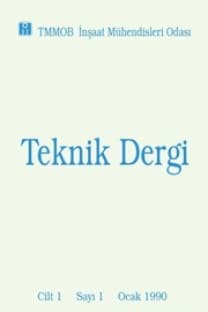An Investigation of Litigation Process in Construction Industry in Turkey
Yapımda Uyuşmazlıklar, Yasal Aktörlerin Yeterlilik Düzeyleri, Yapımda Yasal Süreç, İçerik Analizi
An Investigation of Litigation Process in Construction Industry in Turkey
Disputes in Construction, Competency Levels of Legal Actors, Legal Process in Construction, Content Analysis,
___
- PMI, Guide to the Project Management Body of Knowledge (PMBOK), 5 ed., Pennsylvania. PMI Publications, 2013.
- Sanghera, P., PMP In Depth Project Management Professional Study Guide for the PMP Exam, 4 ed., Boston. Course Technology PTR, 2010.
- lter, D., Dikbaş, A., Less, M., Alternative Dispute Resolution: Suggestions for Application in the Turkish Construction Industry, Construction Management and Economics Conference (CME25), Reading, 2007.
- Oxfordbusinessgroup, Oxford Business Group, 2017. [Online]. Available: https://www.oxfordbusinessgroup.com/overview/turkeys-construction-sector-maintain-its-significant-role-economy-several-large-projects-under-way. [Accessed 05 05 2017].
- İlter, D., Dikbaş, A., An analysis of the key challenges to the widespread use, International Journal of Law in the Built Environment of mediation in the Turkish construction industry, 1, 2, 143-155, 2009.
- Cheung, S., Suen, H. C. H., Lam, T., Fundamentals of Alternative Dispute Resolution Processes in Construction, Journal of Construction Engineering and Management, 128, 5, 409-417, 2002.
- Harmon, K. M. J., Resolution Of Construction Disputes: A Review of Current Methodologies, Leadership and Management in Engineering, 3, 4, 187-201, 2003.
- İlter, D., Dikbaş, A., An investigation of the factors influencing dispute frequency in construction projects, RICS COBRA Research Conference, University of Cape Town, Cape Town, 2009.
- İlter, D., Bakioglu, G., Modeling the Relationship between Risk and Dispute in Subcontractor Contracts, Journal of Legal Affairs and Dispute Resolution in Engineering and Construction, 10, 1, 04517022-1-9, 2018.
- Apanoğlu, E. C., Türkiye’de inşaat sektöründe yargiya intikal eden süre ve özen borcu kaynaklı anlaşmazlıkların analizi, Yüksek Lisans, Çukurova Üniversitesi Fen Bilimleri Enstitüsü, 2007.
- Büyüköztürk, Ş., Kılıç Çakmak, E., Akgün, Ö. E., Karadeniz, Ş., Demirel, F., Bilimsel Araştırma Yöntemleri, 17th ed., Ankara. Pegem Akademi, 2014.
- Yıldırım, A., Şimşek, H., Sosyal Bilimlerde Nitel Araştırma Yöntemleri, 9. ed., Ankara. Seçkin Yayıncılık, 2013.
- İlter, D., Opinions of Legal Professionals Regarding the Selection of Appropriate Resolution Method in Construction Disputes, RICS & CIB International Research Conference (COBRA 2010), Paris, 2010.
- Mevzuat.gov.tr, Hukuk Muhakemeleri Kanunu, 04 02 2011. [Online]. Available: http://www.mevzuat.gov.tr/MevzuatMetin/1.5.6100.pdf. [Accessed 13 02 2017].
- Gözler, K., Hukukun Temel Kavramları, 12 ed., Bursa. Ekin Basım Yayın Dağıtım, 2014.
- TC-Yargıtay-Başkanlığı. [Online]. Available: http://www.yargitay.gov.tr/sayfa/organization-chart/673. [Accessed 16 05 2017].
- TBMM, Türk Borçlar Kanunu, 11 01 2011. [Online]. Available: https://www.tbmm.gov.tr/kanunlar/k6098.html. [Accessed 10 02 2017].
- C. Bvumbwe and D. Thwala, An Exploratory Study of Dispute Resolution Methods in the South African Construction Industry, International Conference on Information and Finance, Singapore, 2011.
- ISSN: 1300-3453
- Yayın Aralığı: 6
- Yayıncı: TMMOB İnşaat Mühendisleri Odası
Construction Site Layout Planning: Application of Multi-Objective Particle Swarm Optimization
Mustafa ORAL, Siamak BAZAATI, Serkan AYDINLI, Emel ORAL
Augmenting in situ lake level measurements with Earth observation satellites
A Moisture Index Map of Turkey for Design of Slabs Resting on Expansive Soils by the GIS Approach
An Investigation of Litigation Process in Construction Industry in Turkey
A Moisture Index Map of TURKEY for Design of Slabs Resting on Expansive Soils by GIS Approach
